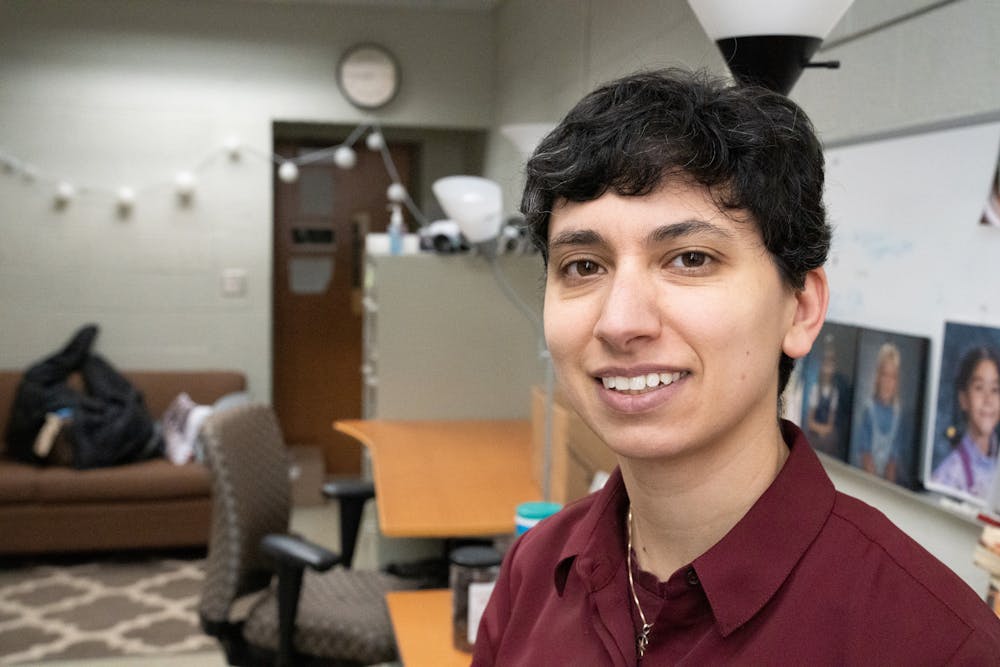An MSU research study tackled eating disorder stereotypes by becoming the first to examine the associations between disadvantage and the risk of disordered eating in boys. The study found that boys exposed to socioeconomic disadvantage are at an increased risk of disordered eating.
Clinical psychology Ph.D candidate Megan Mikhail, the study’s lead author, is a trained biologist. Following their training at Stanford, Mikhail got involved in mental health related research, particularly focusing on eating disorders.
“I experienced an eating disorder when I was younger,” Mikhail said. “It's a topic that I think we don't know enough about and I wanted to use the skills that I developed in the basic sciences to inform what we know about eating disorders.”
Mikhail's study found there was a direct connection between higher levels of disadvantage and higher levels of disordered eating symptoms. This could be influenced by the boy's genetics and their environment.
Both of these conditions were examined by using a population of twin males.
Because identical twins share 100% of their DNA, looking at the difference in experiences of identical and fraternal twins can show if there are genetic reasons. The results of the study suggest that there is a 'diathesis stress effect,' which is when a risk for a mental health condition is activated or amplified under a lot of stress.
“It looked like genetic risk was actually expressed more in those disadvantaged environments,” Mikhail said. “So it fit with that idea that boys who had genetic risk and then had this environmental stressor were really at high risk for disordered eating.”
Eating disorders are often thought to only affect young, white, wealthy women, Mikhail said. Due to this stereotype, a majority of eating disorder research is focused on this demographic.
Psychology senior Jessica Skaff is the president of Spartans Empower Body Acceptance, or SEBA, an eating disorder awareness club on campus. She works as a research assistant in the same lab as Mikhail on another male-focused study. She said a lot of stereotypes about eating disorders stem from their portrayal in the media, which focuses primarily on anorexia.
“When you look at our diet culture … typically you see with girls, it's more of the skinny ideal whereas with guys, it's more times than not this more muscular look,” Skaff said. “Which I think can sometimes be hard to comprehend when you're talking about eating disorders, because typically, to the average person when you say eating disorders, you think of some emaciated very, very, very thin, white girl.”
Skaff said symptoms of disordered eating are extremely normalized, which makes it hard to recognize when someone might need help. It is even harder for people in underrepresented groups because they are less likely to think it is possible for their behavior to fall under disordered eating, which is why research like hers and Mikhail’s is important to her.
SEBA treasurer and dietetics junior Paige Helfen said the results of Mikhail’s study didn’t surprise her after what she has learned in her dietetics classes, but that it would have shocked her before she began studying food and food-related diseases.
According to John Hopkins All Children’s Adolescent and Young Adult Specialty Clinic, 95% of people with eating disorders are between 12 and 25.
“If it was more normalized, and there was more research done, people would come forward with more of it, especially boys and men that suffer from them," Helfen said.
As research expands beyond this stereotype, the field is finding there is no one kind of person that can be affected by eating disorders, Mikhail said. They said this expansion is important because non-stereotypical groups are regularly overlooked in eating disorders screenings.
“The hope is that, with this research, there'll be increased screening and then increased availability of treatment for these populations, like disadvantaged boys,” Mikhail said. “So that people are not suffering from an eating disorder without getting support.”
Support student media!
Please consider donating to The State News and help fund the future of journalism.
Discussion
Share and discuss “MSU study first to research socioeconomic disadvantage, eating disorders in boys” on social media.




